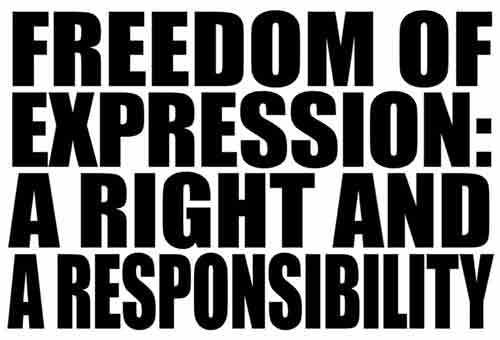
January 19, 2015
Much has been written about the killing of 12 people and the wounding of 11 others at the French satirical weekly publication Charlie Hebdo. The discussion has for the most part been quite healthy concerning free expression. Freedom of expression is a right but it comes with a responsibility.
In the United States, the 1969 Supreme Court in Brandenberg v. Ohio struck down the conviction of a Ku Klux Klan member, and established a new standard: Speech can be suppressed only if it is intended, and likely to produce, “imminent lawless action.” Otherwise, even speech that advocates violence is protected. The Brandenberg standard prevails in the U.S. today. Article 19 of the United Nations Universal Declaration of Human Rights, adopted in 1948, states that “Everyone has the right to freedom of opinion and expression; this right includes freedom to hold opinions without interference and to seek, receive and impart information and ideas through any media and regardless of frontiers.”
Unfortunately, the concept of freedom of expression is not appreciated or understood in most of the Arab world. Blasphemy, for example is prohibited in many Arab countries. For many followers of Islam, the depiction of Muhammad is a contentious issue. The Quran does not explicitly forbid images of Muhammad, but there are a few supplemental teachings which explicitly prohibits Muslims from creating visual depictions of figures. And lampooning Muhammad is certain to raise the ire of most Muslims.
For example, in 2005, the Danish newspaper Jyllands-Posten published 12 editorial cartoons of the Prophet Muhammad. One showed Muhammad flashing a victory sign—with two extended fingers drawn to resemble the burning World Trade Towers. Another depicted Muhammad as a bomb-toting terrorist. Another showed Muhammad with vampire teeth, drinking wine and smoking a cigar. Muslim groups in Denmark complained that the cartoons insulted Muhammad and Islam and the issue eventually led to protests around the world, including violent demonstrations and riots in some Muslim countries. Shouldn’t the editors of Jyllands-Posten have known that the publication of these cartoons would lead to violent demonstrations?
Interestingly, in 2003, Jyllands-Posten refused to run drawings lampooning Jesus Christ. A Danish illustrator submitted a series of cartoons dealing with the resurrection of Christ. He received an email back from the paper’s editor which said: “I don’t think our readers will enjoy the drawings. As a matter of fact, I think that they will provoke an outcry. Therefore, I will not use them.” The newspaper had no compunction in publishing cartoons lampooning Muhammad but not Jesus. Islamophobia? You draw your own conclusions.
Notwithstanding the Danish reaction to the cartoons, in 2006 Charlie Hebdo, and other publications in Germany, Italy, and Spain, republished the cartoons. This caused a new wave of protests across the Middle East.
After the republication, French President Jacques Chirac was quoted as saying, “I condemn all obvious provocations which could dangerously fuel passions. Anything that can hurt the convictions of someone else, in particular religious convictions, should be avoided. Freedom of expression should be exercised in a spirit of responsibility.”
Unrepentant, the first cover of Charlie Hebdo after the attack shows the Prophet Muhammad holding a “Je Suis Charlie” sign with the caption, “All is forgiven.” The newspaper printed a record 3 million copies this week, with financial help from Google, Le Monde and other organizations. It usually prints around 60,000 copies. This edition was translated into six languages including English, Arabic and Turkish. The edition sold out in minutes. This edition triggered a mixed reaction but for the most part, Muslims have heeded their leaders to remain calm.
Jesus and Christianity have not been immune from ridicule by cartoonists. Publications have been met with outrage, economic pressure, loss of advertising and subscribers, and political pressure although I am not aware of anyone being killed or wounded in modern times for publishing such cartoons. For example, in its March edition, The Insurgent, an “alternative” student paper at the University of Oregon, printed 12 hand-drawn cartoons of Jesus as a response to a rival paper The Commentator for having published the controversial cartoons of Muhammad originally published in Jyllands-Posteni. One was a depiction of a naked Jesus on the cross with an erection; the other, titled “Resurrection,” showed a naked Jesus kissing another naked man, both sporting erections. The Insurgent claimed it published the drawings to “provoke dialogue.”
Some of the mandatory student fees at the University of Oregon are set aside for student publications including The Insurgent. In response to cries to cut off funds to The Insurgent, the University President Dave Frohnmayer refused explaining that the university, based on Supreme Court rulings, cannot “exercise control over content by using a threat of removal of fee support. Simply put, neither content nor viewpoint is a lawful basis for denying an allocation of incidental fees to a student group.”
I am not playing a blame the victim game. No one should be killed or injured over cartoons no matter how offensive they are perceived to be. And free expression does not mean that religions shouldn’t be lampooned.
I am in favor of freedom of expression, but at the same time, before publication of a cartoon, the editors should ask themselves whether the cartoon is contributing to the political or social dialogue or is it just to inflame the public. Or more specifically, should the editors of Charlie Hebdo have considered the anti-Muslim sentiment in France and how radicals in the French Muslim community would react to the cartoons, especially after the riots following the the cartoons published by Jyllands-Posten? There is no easy answer.


 The Hunger Site
The Hunger Site
November 23, 2015 at 3:30 pm
More of Ralph blaming the victims of Isis hatred and desire to kill all those who aren’t Islamic. See his current article on the Paris mass killings. More excuses for murderers.
March 22, 2015 at 9:21 am
Only timid, housebroken writers, editors, and artists ask that question.